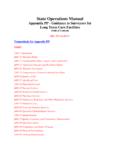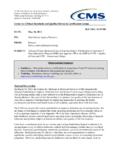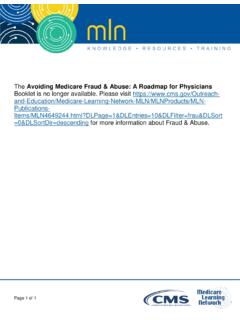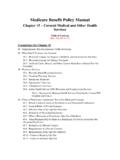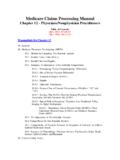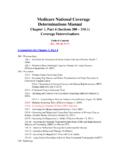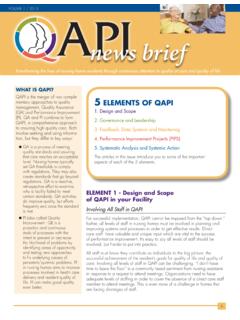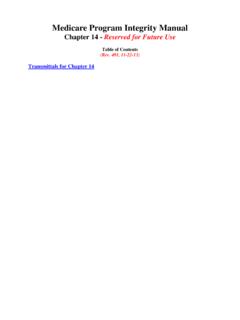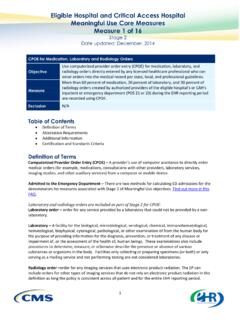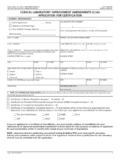Transcription of DEPARTMENT OF HEALTH & HUMAN SERVICES Centers for …
1 DEPARTMENT OF HEALTH & HUMAN SERVICES . Centers for Medicare & Medicaid SERVICES 7500 Security Boulevard, Mail Stop C2-21-16. Baltimore, Maryland 21244-1850. Center for Clinical Standards and Quality/Quality, Safety & Oversight Group Ref: QSO-20-17-ALL. DATE: March 10, 2020. TO: State Survey Agency Directors FROM: Director Quality, Safety & Oversight Group SUBJECT: Guidance for use of Certain Industrial Respirators by HEALTH care Personnel Memorandum Summary The Centers for Medicare & Medicaid SERVICES (CMS) CMS is committed to taking critical steps to ensure America's HEALTH care facilities are prepared to respond to the threat of the Coronavirus Disease 2019 (COVID-19) and other respiratory illnesses. The memo clarifies the application of CMS policies in light of recent Centers for Disease Control and Prevention (CDC) and Food and Drug Administration (FDA) guidance expanding the types of facemasks healthcare workers may use in situations involving COVID-19 and other respiratory infections.
2 Background CMS is committed to taking critical steps to ensure America's HEALTH care facilities are prepared to respond to the threat of the COVID-19 and other respiratory illness. With this announcement, HEALTH care workers in providers and suppliers certified by CMS will have a more expansive range of options to protect themselves and those receiving their care . CMS will continue to explore flexibilities and innovative approaches within our regulations to allow HEALTH care entities to meet the critical HEALTH needs of the country. Guidance The Centers for Disease Control and Prevention (CDC) have updated their Personal Protective Equipment (PPE) recommendations for HEALTH care workers involved in the care of patients with known or suspected COVID-19. At this time, these recommendations will be considered by CMS surveyors to determine if Medicare and Medicaid providers and suppliers are complying with infection control protocols: Based on local and regional situational analysis of PPE supplies, facemasks are an acceptable temporary alternative when the supply chain of respirators cannot meet the demand.
3 During this time, available respirators should be prioritized for procedures that are likely to generate respiratory aerosols, which would pose the highest exposure risk to HEALTH care Providers (HCP). o Facemasks protect the wearer from splashes and sprays. o Respirators, which filter inspired air, offer respiratory protection. When the supply chain is restored, facilities with a respiratory protection program should return to use of respirators for patients with known or suspected COVID-19. facilities that do not currently have a respiratory protection program, but care for patients infected with pathogens for which a respirator is recommended, should implement a respiratory protection program. Eye protection, medical gown, and gloves continue to be recommended. o If there are shortages of medical gowns, they should be prioritized for aerosol- generating procedures, care activities where splashes and sprays are anticipated, and high-contact patient care activities that provide opportunities for transfer of pathogens to the hands and clothing of HCP.
4 Updated recommendations regarding the need for an airborne infection isolation room (AIIR). o Patients with known or suspected COVID-19 should be cared for in a single- person room with the door closed. AIIRs should be reserved for patients undergoing aerosol-generating procedures. Updated information based on currently available information about COVID-19 and the current situation in the United States, which includes reports of cases of community transmission, infections identified in HCP, and shortages of facemasks, N95 filtering facepiece respirators (FFRs) (commonly known as N95 respirators), and gowns. Increased emphasis on early identification and implementation of source control ( , putting a face mask on patients presenting with symptoms of respiratory infection). Additional information on CDC's recommendations above can be found here: Further, the FDA approved the CDC request for an emergency use authorization (EUA) to allow HEALTH care personnel to use certain industrial respirators during the COVID-19 outbreak in HEALTH care settings.
5 The FDA concluded that respirators approved by the National Institute for Occupational Safety and HEALTH (NIOSH), but not currently meeting the FDA's requirements, may be effective in preventing HEALTH care personnel from airborne exposure, including COVID- 19, which can cause serious or life-threatening disease, including severe respiratory illness. This action allows the NIOSH-approved respirators not currently regulated by the FDA to be used in a HEALTH care setting by HEALTH care personnel during the COVID-19 outbreak, thereby maximizing the number of respirators available to meet the needs of the HEALTH care system. PLEASE NOTE: Due to the updated CDC guidance and current supply demands of these devices (and the discards associated with testing), CMS is directing surveyors not to validate the date of the last FIT test for HEALTH care workers in Medicare and Medicaid certified facilities , until further notice. Page 2 of 4.
6 The press release announcing FDA and CDC action to increase access to respirators, including N95s, for HEALTH care personnel, can be found at: cdc-take-action-increase-access-respirat ors-including-n95s The EUA letter can be found at Appendix A: A list of approved Filtering Facepiece Respirators (FFRs) eligible for coverage under this EUA are posted on the FDA's website: Appendix B: A list of NIOSH-approved FFRs authorized under this EUA can be found here: Therefore, any CMS guidance that explicitly, or by reference, indicates N-95 or PPE usage will automatically incorporate any FFRs authorized under this EUA and any guidance issued by the CDC. This memo is effective for all Medicare and Medicaid provider and certified supplier types: 1. Hospitals 2. Religious Nonmedical HEALTH care Institutions (RNHCIs). 3. Ambulatory Surgical Centers (ASCs). 4. Hospices 5. Psychiatric Residential Treatment facilities (PRTFs). 6. Program of All-Inclusive care for the Elderly (PACE).
7 7. Transplant Centers 8. Skilled Nursing facilities (SNFs) and Nursing facilities (NFs). 9. intermediate care facilities for Individuals with Intellectual Disabilities- ICF/IID. 10. Home HEALTH Agencies (HHAs). 11. Comprehensive Outpatient Rehabilitation facilities (CORFs). 12. Critical Access Hospitals (CAHs). 13. Clinics, Rehabilitation Agencies, and Public HEALTH Agencies as Providers of Outpatient Physical Therapy and Speech-Language Pathology SERVICES 14. Community Mental HEALTH Centers (CMHCs). 15. Organ Procurement Organizations (OPOs). 16. Rural HEALTH Clinics (RHCs) and Federally Qualified HEALTH Centers (FQHCs). 17. End-Stage Renal Disease (ESRD) facilities In addition, we're providing the following information about some specific areas related to COVID-19 and this EUA: CDC Resources: Strategies for Optimizing the Supply of N95 Respirators: %2F2019-ncov%2 Fhcp% CDC Resources for HEALTH care facilities : ncov/healthcare- Page 3 of 4.
8 CDC Updates: CDC FAQ for COVID-19: CDC guidance for Infection Prevention and Control Recommendations for Patients with Confirmed Coronavirus Disease 2019: ncov/infection- FDA Resources: Emergency Use Authorizations: situations-medical-devices/emergency-use -authorizations Contact: Questions about this document should be addressed to Effective Date: Immediately. This policy should be communicated with all survey and certification staff, their managers and the State/Regional Office training coordinators within 30. days of this memorandum. /s/. David R. Wright cc: Survey and Operations Group Management Page 4 of 4.
